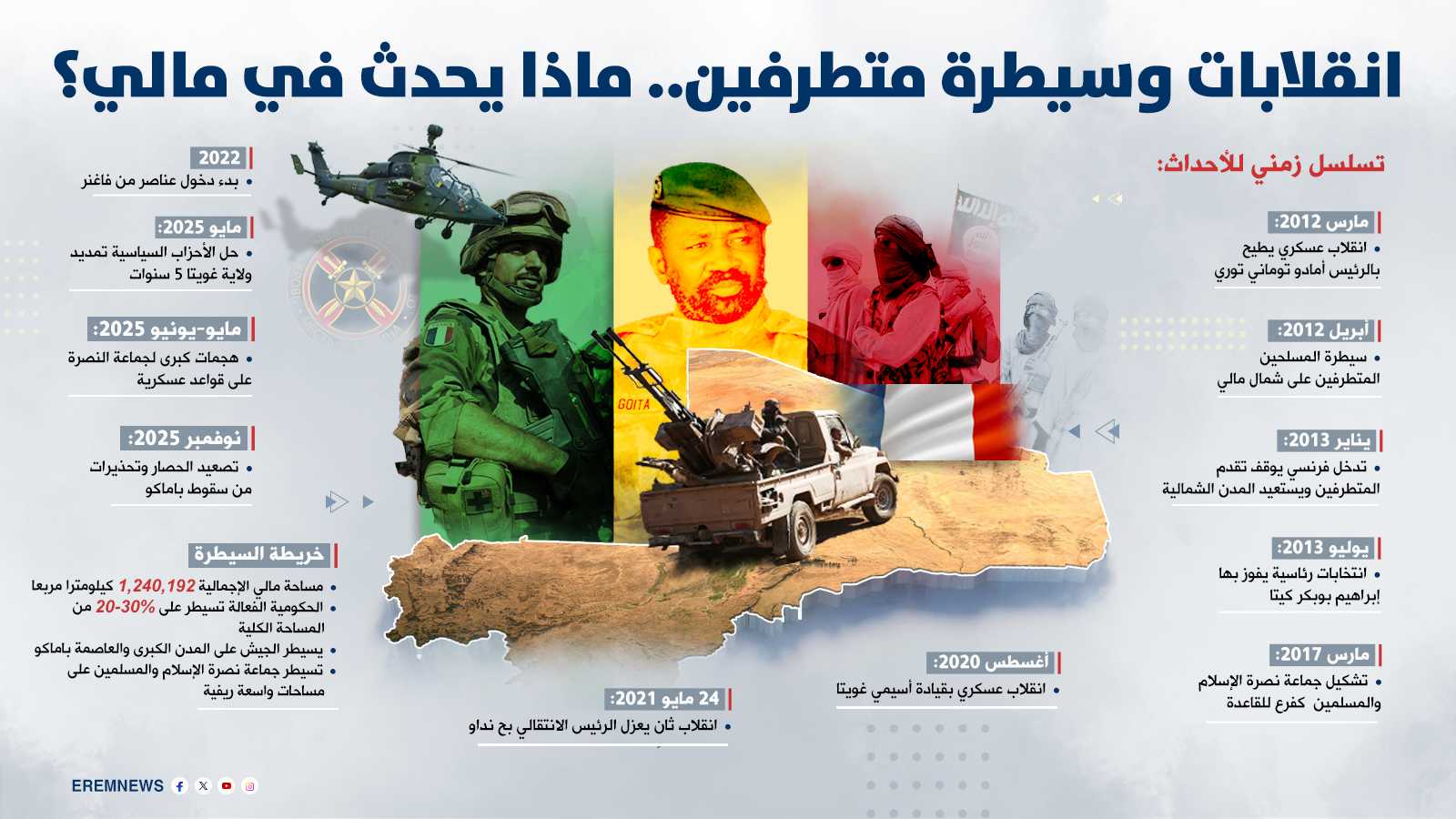Events in Mali are accelerating amid growing fears of an imminent explosion, as armed groups continue their strategy of economic strangulation that has intensified over recent weeks. n nWestern capitals have moved swiftly to withdraw diplomatic personnel and evacuate citizens, signaling developments that could have disastrous consequences for Mali’s military regime, which has ruled since a coup five years ago. n nThe government in Bamako faces mounting pressure as extremist factions tighten their grip, threatening not only national stability but also regional security. Neighboring countries like Burkina Faso and Niger—both under military leadership—are vulnerable to spillover effects that could destabilize their own governments. n nThe ruling military council in Mali is confronting its most severe crisis since seizing power, despite support from the Russian-linked Africa Corps and the acquisition of advanced Turkish weaponry. The capital, Bamako, remains under blockade, with supply lines for food and fuel severed, undermining the regime’s ability to maintain control. n nAlthough Malian Foreign Minister Abdoulaye Diop reassured foreign residents during a routine consular meeting on November 5th about their safety, France, the United States, Britain, and Germany have all urged their nationals to leave immediately. Diop argued that militants shifting tactics to target economic infrastructure reflects their weakening military position and diminishing geopolitical ambitions. n nOn October 22nd, military leader Assimi Goïta dismissed key defense officials, including the deputy chief of staff, military security director, and army chief of staff. Yet, Malian forces have failed to break the siege, leaving the capital trapped in a cycle of scarcity and vulnerability. n nAn informed Malian source told “Erem News” that the militant group Jama’at Nusrat al-Islam wal-Muslimin (JNIM) could gain short-term control over parts of Mali, though urban centers may resist full domination. JNIM’s advances could position it for negotiations from strength with the current regime or any future government, especially as local leaders in central Mali have already agreed to ceasefires with the group. n nThis growing influence allows JNIM to consolidate power by leveraging strategic locations to tax flows of fuel, drugs, and gold. The group, formed in 2017 through the merger of several militant organizations including Al-Qaeda in the Islamic Maghreb, has pledged allegiance to the network responsible for the September 11, 2001 attacks. n nIf the Malian regime falls to JNIM, it would mark a historic shift—realizing a scenario Paris sought to prevent in 2013 through military intervention. Now, three years after French forces withdrew and were replaced by foreign contingents, this outcome appears increasingly plausible. n nEven if Bamako falls, JNIM would still face challenges from rival groups such as the Islamic State in the Sahel and the rebel Tuareg forces in northern and eastern Mali, raising the risk of national fragmentation. n nIn recent weeks, hundreds of tanker trucks have been ambushed and looted. Malian forces stationed in Kati, near the capital, were unable to respond due to fuel shortages—a stark illustration of the self-reinforcing crisis gripping the country under siege. n— news from إرم نيوز
— News Original —
من يرسم “خطوط النار” في مالي؟
tتسارع الأحداث في مالي وسط توقعات بانفجار وشيك، مع استمرار سياسة “الخنق الاقتصادي” التي تنتهجها الجماعات المسلحة منذ أسابيع. n nومع مسارعة عواصم غربية إلى سحب دبلوماسييها وإجلاء رعاياها، تنذر التطورات بعواقب كارثية على النظام العسكري الحاكم في مالي منذ الانقلاب الذي قاده قبل 5 سنوات. n nويواجه جيران مالي، عواقب كارثية قد تؤدي إلى انهيار حكومات فيها نتيجة “استراتيجية الخنق الاقتصادي” التي يشنها المتشددون على السلطة في باماكو. n nوأبرز دول جوار مالي، بوركينا فاسو والنيجر، وهما دولتان ساحليتان أخريان تقودهما مجالس عسكرية ذات سيادة، فمن حرك خيوط إعادة رسم التوازنات الإقليمية؟ n nيواجه المجلس العسكري الحاكم في مالي، في ظل حصار عاصمته باماكو من قبل المتشددين، أزمة لم يواجهها منذ استيلائه على السلطة قبل 5 سنوات، على الرغم من دعم “فيلق إفريقيا” الروسي واقتناء الجانب المالي أسلحة تركية متطورة. n nورغم طمأنة وزير الخارجية المالي عبد الله ديوب للأجانب خلال اجتماعه الدوري مع السلك القنصلي المعتمد لدى باماكو، يوم الخامس من نوفمبر الجاري بـ”حماية الماليين والأجانب المقيمين”، إلا أن فرنسا والولايات المتحدة وبريطانيا وألمانيا أبلغت رعاياها بضرورة مغادرة البلاد فورا. n nوقال الوزير ديوب إن تحول المتطرفين في تكتيكاتهم، باستهدافهم الآن للأصول الاقتصادية، يُشير إلى ضعفهم في مواجهة القوات الدفاعية والأمنية، وإلى تراجع زخم مخططهم الجيوسياسي لزعزعة استقرار مالي. n nوبينما أقال أسيمي غويتا، رئيس المجلس العسكري، نائب رئيس أركان القوات المسلحة، ومدير الأمن العسكري، ورئيس أركان الجيش يوم 22 أكتوبر الماضي لم تتمكن القوات المالية حتى الآن من كسر الحصار الذي يقطع إمدادات الغذاء والوقود عن العاصمة. n nولفت مصدر مالي مطلع في تصريح لـ”إرم نيوز”، إلى سيناريوهات سيطرة جماعة نصرة الإسلام والمسلمين على مالي على المدى القصير، والتي قد تواجه صعوبات في المراكز الحضرية الكبرى. n nوقد يسمح تقدم الجماعة بالتفاوض من موقع قوة مع المجلس العسكري أو أي حكومة في المستقبل، مشيرا إلى فرض العديد من قادة المجتمعات المحلية بالفعل وقف إطلاق النار مع التنظيم في وسط البلاد. n nومن شأن ذلك أن يسمح للجماعة بتعزيز نفوذها في المنطقة، لا سيما من خلال الاستفادة من موقع استراتيجي لفرض ضرائب على تدفق الوقود والمخدرات والذهب. n nوالمحرك الرئيس للأحداث هي جماعة نصرة الإسلام والمسلمين التي تأسست عام 2017، نتيجة اندماج عدة تنظيمات مسلحة، منها تنظيم القاعدة في بلاد المغرب الإسلامي، وأعلنت ولاءها للجماعة المسؤولة عن هجمات الحادي عشر من سبتمبر 2001. n nوسيُمثل سقوط النظام المالي على يد جماعة نصرة الإسلام سابقة تاريخية بالاستيلاء على السلطة في سيناريو حاولت باريس تجنبه عام 2013 بتدخلها العسكري، لكن بعد 3 سنوات من انسحاب القوات الفرنسية واستبدالها بقوات أجنبية يقترب هذا السيناريو من التجسيد. n nومع ذلك، حتى في حال سقوط باماكو، ستظل جماعة “نصرة الإسلام والمسلمين” تواجه خطر تفكك البلاد، مع احتفاظ منافسها، تنظيم داعش في منطقة الساحل، بوجودها في شمال وشرق مالي. n nوخلال الأسابيع الأخيرة تعرضت مئات شاحنات الصهاريج لكمائن، واستولى المتشددون على جميع محتوياتها، بينما لم تتمكن القوات المالية المتمركزة في كاتي، قرب باماكو، من التدخل بسبب نقص الوقود، وهي واقعة تُجسّد الحلقة المفرغة التي تواجهها العاصمة المالية، التي تفتقر، بسبب الحصار، إلى وسائل كسره.
